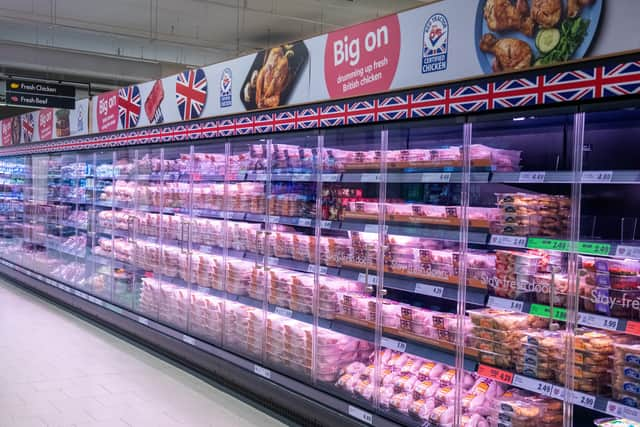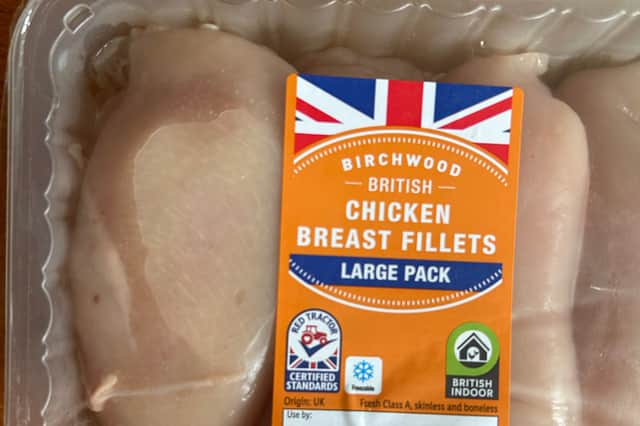Lidl chicken welfare: Big changes to supermarket's standards - a month after investigation into 'faeces burns'
and live on Freeview channel 276
A UK discount supermarket chain has committed to better living conditions for chickens, one month after an investigation claimed to turn up evidence of widespread ailments linked to poor animal welfare.
On Tuesday (March 26), Lidl Great Britain announced big changes to animal welfare standards for its own-label fresh chickens. The supermarket says it will work with suppliers to increase the space allocated to its birds by 20% above the industry standard from this summer - with the transition set to be completed early 2025.
Advertisement
Hide AdAdvertisement
Hide AdThis comes after an investigation by animal welfare charity Open Cages late last month, which surveyed fresh chicken products sold in 40 different UK Lidl stores. It said its team found 'hock burns' - brown ulcers on the leg joints of chickens usually caused by being exposed to their own waste - on 74% of whole birds examined. Lidl disputed these findings, saying its own figures showed less-severe 'hock markings' or burns on just 4.8% and 6% of chickens checked from its two suppliers, respectively.
However, Open Cages also claimed members detected ‘white striping disease’ in 94% of Lidl’s packaged chicken breasts - a muscle disorder characterised by white lines across the breast meat, linked to poultry growing to large sizes rapidly. A NationalWorld investigation found what appeared to be white striping disease on almost all of the chicken breasts at one South London Lidl, as well as three other stores owned by different supermarkets in the same part of the city.


Lidl maintained that the changes had been in the works for some time, and were not linked to the investigation. The British Poultry Council has also previously raised concerns, telling the BBC that "drawing comparison between formal inspection and rigorous procedure versus a shop-shelf experiment has potential to mislead and misinform".
Lidl's new commitment would see the maximum stocking density reduced to 30kg per square metre, which it said would positively impact the living conditions of the birds. Providing chickens with more space to roam would let them engage in more of their natural behaviours, they said, like stretching their wings, dust bathing and exploring, giving them more fulfilling lives. The discounter added that it would help set its suppliers up for success during the transition period, by increasing its investment.
Advertisement
Hide AdAdvertisement
Hide AdChief commercial officer Richard Bourns said animal welfare was a priority for the supermarket. "We are dedicated to ensuring all animals within our supply chain lead good lives. This initiative is a testament to our strong supplier relationships and underscores our continued commitment to championing British food and farming."
Lidl was "devoted" to working with its partners throughout the supply chain to influence positive change, he continued. "Through ongoing engagement and longer term agreements, we’re able to provide them with the confidence needed to make the necessary investments that will help move the dial on animal welfare. This approach ensures our customers can count on us to deliver improved animal welfare standards, as we continue to offer them quality produce at market leading prices."


Open Cages founder Connor Jackson told NationalWorld that he was always happy to see a large company improve the space in which birds could move. "This is obviously significant and I hope to see more retailers following this trend."
However, he said the move came amid an international campaign asking Lidl to commit to the full Better Chicken Commitment (BCC) - "just like hundreds of companies have done, including M&S, KFC, and Lidl in France".
Advertisement
Hide AdAdvertisement
Hide Ad"It’s important that Lidl does not end their ambitions for chickens here. I am reaching out to Lidl today to suggest a time where we can discuss how they can stop selling chickens that are bred to grow so fast that they often become sick and cannot walk in a normal fashion," Mr Jackson continued.
In its statement, Lidl added that all fresh chicken supplied to its British stores already complied with a number of nationally recognised third-party standards, including the Red Tractor certification and RSPCA Assured.
"Notably, Lidl’s free-range RSPCA Assured chicken, which it sells more of than any other retailer in the market, exceeds the requirements of the Better Chicken Commitment, further exemplifying its dedication to ethical sourcing and providing customers with quality product."
Looking at self-reported supermarket figures, a number of other chains had noted much higher incidences of hock burns or markings - in more than 30% of their birds in some instances. However, all retailers had slightly different counting and reporting methods, criteria for what constituted reporting, and levels of transparency around their figures.
Comment Guidelines
National World encourages reader discussion on our stories. User feedback, insights and back-and-forth exchanges add a rich layer of context to reporting. Please review our Community Guidelines before commenting.
